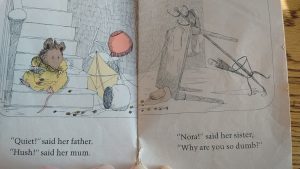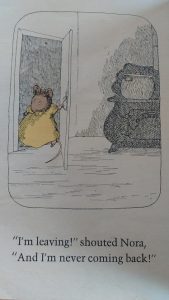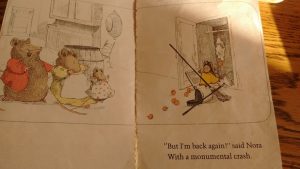This Week’s Bit of String: The D-Word
Once upon a time, my brother and sisters and I loved visiting my grandparents in their house of forty years. The AM radio constantly played vintage hits, and yummy smells wafted from the kitchen. There was always a bowl of popcorn in the lounge, between two puffy armchairs, and there was an extra rocking chair, quite small, for us children to take turns in. And while we did, Grammy read to us.
Apparently November was Picture Book Month, which caused me to reflect on my personal favourite, a tiny paperback at Grammy’s called Noisy Nora (Scholastic Book Services edition, 1973). It’s written by Rosemary Wells, who also created Max and Ruby, later making a mint off them, I expect.
Noisy Nora featured cute pictures of an anthropomorphised mouse family, amongst whom Nora was the [seemingly] neglected middle child. The story unfolds in rhyme. Nora attempts to entertain herself while her parents are busy with her siblings, but everything she tries [perhaps intentionally] attracts this refrain of not-so-positive attention:
‘Quiet!’ said her father.
‘Hush!’ said her mum.
‘Nora,’ said her sister, ‘why are you so dumb?’
Now, at this last line, my grandmother would hesitate as if she didn’t want to say the word dumb. So I would shout it in a rare act of rebellion—back then dumb was like a swear to us.

Looking back now, I’m sure Grammy didn’t really have a problem with that word.
Evidence A: She once marched off to find a dictionary and read the official definition of contraception when my youngest sister asked.
Evidence B: Grammy told me when I was sixteen and my father (the youngest of her six children) had lost his temper and made me cry, ‘You know, we made some mistakes as parents. He acts this way sometimes because we didn’t help him do what you’re doing now. So go on and let it out.’
I suspect she gave me the job of shouting, ‘DUMB!’ because she knew I needed to let that out. The same way she taught us to make faces and say, ‘Blech!’ when our mother had to give us Robitussin. I asked my mother, more recently, if that had bothered her.
‘Not at all,’ she said, ‘because it made taking medicine more fun for you. That’s why she did it.’
A spoonful of self-expression makes the medicine go down.

My Grammy had also been one of ten children herself, in a farming family that had to split up during the Depression to ensure everyone got fed. She loved her brothers and sisters dearly, but maybe she understood about sibling rivalry. I wish I knew whether she thought about her own childhood at all when reading Noisy Nora to me.
Noisy Nora showed me the powerful release just one word can bring. A little story, even populated by mice, could reflect my reality, and it didn’t need to have dragons or princes to be exciting and fun.
What other lessons have we learned from picture books that impact us as writers?
Building Imagination: The book that got me reading (because I was so desperate, at the age of 3, not to wait until someone was available to read it to me) was a picture book version of The Wizard of Oz. Books like that transport characters to extraordinary worlds—even though they’re perfectly ordinary kids. They step into wardrobes, or try playing a board game found in the park, and suddenly anything can happen. Stepping into these worlds is the exact reason we perfectly ordinary writers pick up a pencil and begin a story.
Provoking Sympathy: Picture books make obstacles look exciting, encouraging children to consider new situations they haven’t personally faced. For kids, it doesn’t matter whether a character is a princess or an orphan, black like the ukulele-wielding boy who takes down Abiyoyo or Chinese like the woman who pursues her dumpling into the underworld, an elephant like Babar or a mouse like Nora. They still care what happens, and as writers—and, well, as human beings—that’s nice to revisit.
Fostering Rebellion: Many popular children’s book characters get vindicated, no matter what mistakes they make. Max returns from Where The Wild Things Are to find his dinner ready for him, after all. Curious George and Amelia Bedelia always find ways to save the day after nearly ruining it. These teach us that it’s okay for characters to be flawed; they can still be heroes. I’m pretty sure a lot of us writers find those types of characters even more appealing now that we’re grown up.

Recognising Patterns: Our very earliest picture books—Goodnight Moon, the work of Dr Seuss—introduce to us a sense of rhythm and rhyme, making reading beautiful and musical. Those are important qualities to maintain even when writing prose as an adult. Consider also series such as Madeline and Curious George, in which each book starts the same to reintroduce the protagonist: (‘Twelve little girls in two straight lines…’) These help us develop an understanding of backstory and appreciation for consistency.
Encouraging Expression: Books like Noisy Nora showed me it was okay to have occasional misgivings about sharing attention with my brother and sisters. I would never have used the word dumb at that age, but I could say it through a character. Perhaps that act of ventriloquism helped instigate my love of writing, but I suspect it sprung also from what sheer fun this and other picture books were, and are.
What were your favourite picture books? How do you think they influenced you later in life?



















